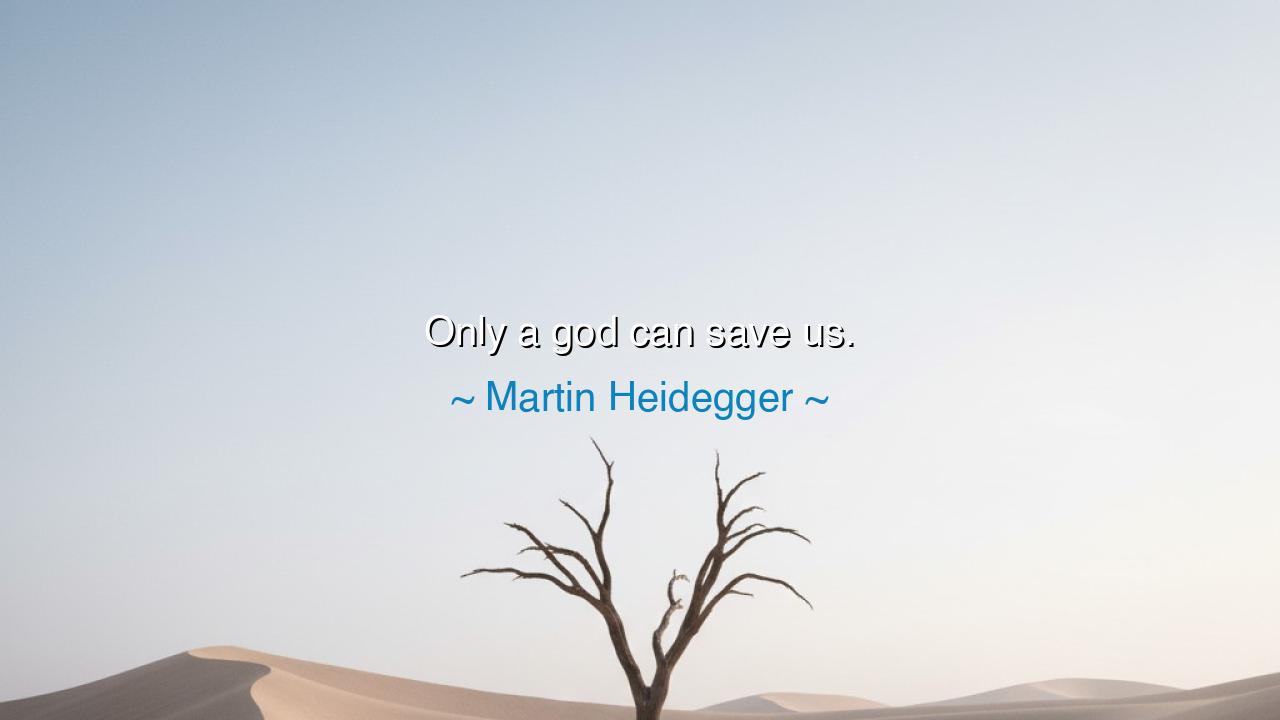
Only a god can save us.






“Only a god can save us.” Thus spoke Martin Heidegger, the brooding philosopher of the twentieth century, whose words echo like thunder over the ruins of modern civilization. This was not the cry of a mystic nor the confession of a priest, but the lament of a thinker who had peered into the heart of modernity and found it hollow. Heidegger saw a world drunk on technology, proud of its machines and systems, yet emptied of meaning. And so, in the twilight of his life, he uttered these grave and haunting words — not as prophecy, but as truth: that humanity, having forgotten the sacred, cannot save itself by intellect or progress alone.
When Heidegger said “Only a god can save us,” he did not speak of the gods of old, nor of a return to religion in its outer form. He spoke of a renewal of the sacred — a rebirth of reverence, of humility before the mystery of Being. He saw that mankind had made itself master of the earth, yet in its mastery had lost its soul. The modern age, in its pursuit of power, had forgotten wonder. Men no longer asked, “What is the meaning of existence?” but only, “How can we use it?” The world had become a resource, the human spirit a tool, and Being itself — that ineffable presence that once inspired art, prayer, and awe — had been buried beneath machinery and noise.
Heidegger’s cry came during the dark years after World War II, when Europe lay in ashes and the dreams of reason had turned to horror. He had witnessed the rise of ideologies that promised salvation through human will — through politics, science, and conquest. But those promises led to death. He saw that the same technological power that could light a city could also destroy it. And so he withdrew into silence, to the quiet forests of his homeland, and there concluded that no human system — not philosophy, not politics, not progress — could restore the soul of man. Only a god, he said — some awakening of the sacred dimension of life — could call humanity back from the abyss.
Consider the story of Oppenheimer, the father of the atomic bomb. When he saw the first explosion, he recalled the ancient words of the Bhagavad Gita: “Now I am become Death, the destroyer of worlds.” In that moment, the triumph of science turned to terror. The very brilliance that had made man feel godlike revealed the peril of his pride. Oppenheimer’s remorse was not for the weapon alone, but for what it revealed — that humanity, untempered by humility, cannot be trusted with the powers it wields. This is the truth Heidegger foresaw: when knowledge advances without wisdom, it becomes a curse; when man forgets the sacred, he becomes his own destroyer.
Yet Heidegger’s words are not despair, but a warning — and perhaps, a hope. When he said “only a god,” he meant that salvation must come from beyond the reach of human calculation. It may not be a deity of creed, but a new awakening, a return to stillness, to reverence for Being itself. Humanity must rediscover what it means to dwell poetically on the earth, as the ancients did — to see the world not as an object to be controlled, but as a gift to be honored. For only through such awakening can the heart of man be healed and creation itself be saved.
And what, then, does this mean for us? It means we must recover the sacred gaze — that way of seeing life not as utility, but as wonder. To stand before a sunrise, a child, a work of art, and feel again that holy astonishment that says, “This is.” We must silence the constant noise of modern striving and listen for what Heidegger called “the voice of Being” — that quiet call that speaks not through machines, but through nature, through beauty, through love. This is not a call to abandon reason, but to redeem it with reverence.
So, O seekers of truth, remember this: humanity cannot save itself through mastery alone. The intellect builds towers, but only the spirit gives them light. Let us, therefore, live not as conquerors of the earth, but as its keepers. Let our technology serve compassion, our knowledge serve humility, our strength serve beauty. For when we begin again to honor the sacred — whether we name it God, or truth, or Being — we will have found the salvation Heidegger longed for.
For in the end, “Only a god can save us” means this: only by awakening to the divine that already dwells within the fabric of existence — in every breath, every life, every moment — can humanity rise from its self-made darkness. And until that awakening comes, the world will remain restless. But if we listen, and remember, and revere, then perhaps — just perhaps — the god we await is not distant, but waiting patiently within the human heart.






AAdministratorAdministrator
Welcome, honored guests. Please leave a comment, we will respond soon